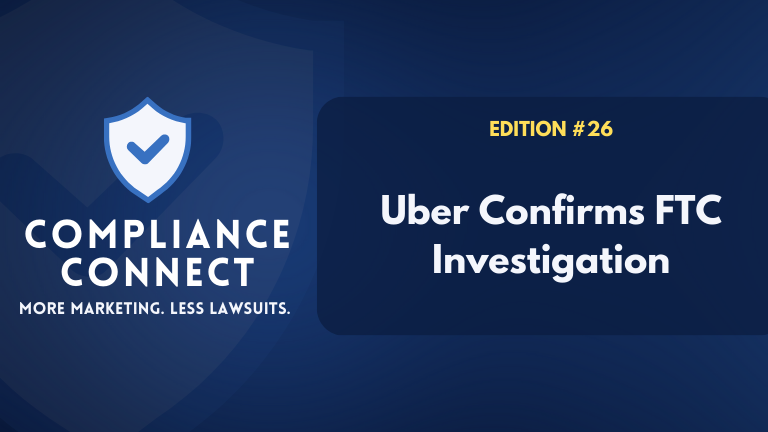Good morning! This is the twenty-sixth edition of the Compliance Connect newsletter.
The goal is simple: to keep you in the loop on what the FTC and other regulatory agencies are up to so that you can protect yourself.
These newsletters will land in your inbox twice a week – Mondays and Thursdays.
Remember: this is NOT legal advice, only information!
Here’s the rundown today…
- 🚕 FTC Targets Uber For Subscription Violations
- 🗽 New York Adds New Rule For Telemarketing Calls
- 🎨 Why Is The FTC Suing Adobe?
- 📱 Marketer Beware: How You Contact Prospects
- ⚖️ When Did The FTC’s Mandate Grow?
Compliance Digest: What You Should Read Today
Uber’s Subscription Service Target Of FTC Probe
The FTC is investigating Uber’s Uber One subscription service for potential consumer protection violations.
The investigation focuses on how users are enrolled and the ease of canceling subscriptions.
Uber claims its cancellation process is quick and complies with the law, stating most cancellations take 20 seconds or less.
In response to the investigation, the FTC proposed a settlement with a significant monetary penalty. Uber countered with its own offer, but the FTC staff rejected it.
Uber accused the FTC of rushing the settlement process just two months into the probe.
Republican Commissioner Melissa Holyoak raised concerns about the agency’s haste ahead of the presidential administration change. She is among the candidates to lead the FTC under the incoming Trump administration.
New York Imposes New Requirements On Telemarketers
New York Kathy Hochul signed into law a series of consumer protection laws.
One of these is a bill which requires telemarketers to disclose key information within 30 seconds of starting the call, including…
- Who is calling
- Whether the call is being recorded
- The option to be added to the company’s INTERNAL do not call list at the beginning of the call
- The purpose of the call
- The address of any company on whose behalf the telemarketer is providing telemarketing services
This gives New York some of the strictest telemarketing requirements in the country.

Case Breakdown: Adobe
The FTC is pursuing an ongoing case with Adobe, the company which makes Photoshop and other popular software programs.
For over 10 years, they have offered various subscriptions which give users access to different packages of software.
The FTC believes that these subscription programs are deceptive and harm customers.
We’re going to discuss some of the highlights of the complaint letter.
Remember, this is just the FTC’s perspective. Here is Adobe’s statement responding to the accusations, which they DENY.
ROSCA Violations
The Restore Online Shoppers Confidence Act (ROSCA) is the main law that regulates recurring programs.
ROSCA requires subscription offers to…
- Clearly and conspicuously disclose all material terms of the transaction BEFORE asking for billing information
- Obtain the customer’s express consent
- Make it easy to cancel a subscription.
The FTC claims that Adobe violates ROSCA with its enrollment flow.
Annual Subscription Deception
Most companies offer a discount when customers commit to a full year of the subscription. Usually it is paid in full upfront.
Adobe offered a discounted annual plan that was paid MONTHLY. If a customer cancels before the full year is up, they need to pay an early termination fee.
None of this is illegal, but the FTC claims that Adobe was deceptive in how it sold customers the plan.
- This plan was pre-selected on the order page.
- The early termination fee was not clearly disclosed and many reasonable customers would not be aware of it.
- As a result many customers signed up for the plan and were surprised after they canceled to get charged the early cancellation fee.
Difficult Cancellations
Adobe customers could cancel online or via chat/phone.
The FTC claims that Adobe forced customers who canceled online to click through multiple pages and tried to conceal the cancellation button.
Adobe also forced customers to review and confirm a variety of consequences for losing their subscription, such as the loss of important files and the early termination fee.
As for phone and chat cancellation, the FTC says that customers complained of inconvenient hours, dropped calls and being forced to talk to multiple people.
The surprise cancellation fees were allegedly used to discourage customers from following through on the cancellation.
Adobe’s Response
The case is ongoing and doesn’t appear close to a settlement.
Here is how Adobe responds to some of the FTC’s claims.
- Adobe’s subscription model is good for customers because it allows them to innovate their products and gives customers more choices.
- Their cancellation flow is not in violation of ROSCA. claiming that it’s just a 4 step process that can be completed in a minute.
- They are transparent with their terms and conditions and subscription agreements.
Did You Know…
The FTC’s mandate was expanded in 1938 when Congress banned “unfair and deceptive acts and practices.”

Quick Compliance Tip: Hidden Phone Numbers & Ringless Voicemails
Marketers have been implementing new ways of reaching out to prospects, such as…
- Ringless voicemails
- Robocalls
- A.I. calls
- Text messages
- Voice notes
…and more.
These aren’t all illegal. If you get express consent to communicate with a prospects and you follow other guidelines, then you can use them.
However, if you don’t do those things then you might have a serious problem.
MANY regulators have a problem with this: the FCC, FTC and even states.
There is A LOT of activity around the rules to be able to call and text prospects.
Your phone number, robo-dialing, A.I. voices all have strict rules coming out that are in favor of the consumer.
If you send even ONE text message outside the law, the receiving consumer can easily sue you.
There are attorneys who specialize in helping administer these calls, and the laws are only getting more stringent with
Written permission is needed. Timing of calls and how often you can call them in a certain period is now dictated.
These rules are evolving daily and states are starting to step up and have their own regulations.
I wanted to put this on your radar because if you have webinars that send out text messages or sales agents that make phone calls, you need to get compliant FAST because there is going to be a barrage of regulators and private law suits coming in this area.
